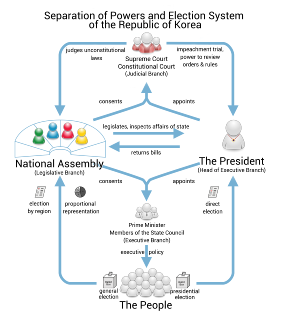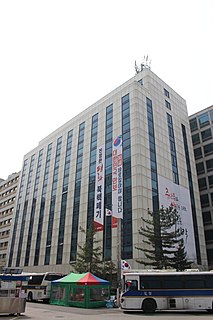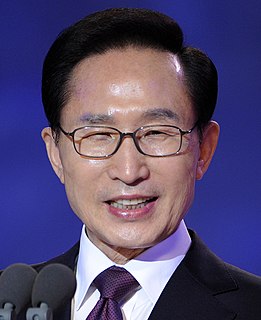Related Research Articles

The history of South Korea formally begins with its establishment on 15 August 1948.

The politics of the Republic of Korea takes in place in the framework of a presidential representative democratic republic, whereby the President is the head of state, and of a multi-party system. The government exercises Executive power and Legislative power is vested in both the government and the National Assembly. The Judiciary is independent of the executive and the legislature and comprises a Supreme Court, appellate courts and a Constitutional Court. Since 1948, the constitution has undergone five major revisions, each signifying a new republic. The current Sixth Republic began with the last major constitutional revision in 1987.

The Korean Alphabet Day, known as Hangeul Day (한글날) in South Korea, and Chosŏn'gŭl Day in North Korea, is a national Korean commemorative day marking the invention and the proclamation of Hangul, the alphabet of the Korean language, by the 15th-century Korean monarch Sejong the Great. It is observed on October 9 in South Korea and on January 15 in North Korea. In 2013, Hangul Day became a national holiday in South Korea.

The Liberty Korea Party was a conservative political party in South Korea that was described variously as right-wing, right-wing populist, or far-right. Until February 2017, it was known as the Saenuri Party (Korean: 새누리당), and before that as the Hannara Party from 1997 to 2012, both of which are still colloquially used to refer to the party. The party formerly held a plurality of seats in the 20th Assembly before its ruling status was transferred to the Democratic Party of Korea on December 27, 2016, following the creation of the splinter Bareun Party by former Saenuri members who distanced themselves from President Park Geun-hye in the 2016 South Korean political scandal.
Barry Devolin, spent the first 35 years of his career in politics, government and academia, but is now establishing himself in the travel industry as a Tour Director with DeNure Tours and as an independent travel consultant, known as BarryTravelMaven, where he focuses on planning "amazing vacations at affordable prices" for families and young people.

The parliamentary committees are sub-legislative organizations each consisting of small number of Members of Parliament from the House of Commons, or peers from the House of Lords, or a mix of both appointed to deal with particular areas or issues; most are made up of members of the Commons. The majority of parliamentary committees are select committees. The remit of these committees vary depending on whether they are committees of the House of Commons or the House of Lords.

Lee Myung-bak is a South Korean former politician and businessman who served as President of South Korea from 2008 to 2013. Before his election as president, he was the CEO of Hyundai Engineering and Construction, as well as the mayor of Seoul from 1 July 2002, to 30 June 2006. He is married to Kim Yoon-ok and has three daughters and one son. His older brother, Lee Sang-deuk, is a South Korean politician. He attends the Somang Presbyterian Church. Lee is a graduate of Korea University and received an honorary degree from Paris Diderot University on 13 May 2011.

Early in its development, South Korea lacked home-grown research and policy expertise needed to support the country's economic development. To address this, the Korea Development Institute (KDI) was established in 1971 to conduct policy research and analysis on fundamental economic and social issues using scientific methods to support the nation's development efforts. It was the first of its kind in the republic's young history.

Chung Un-chan was the Prime Minister of South Korea (2009–2010). He was a professor of Seoul National University from 1978 to 2009, serving as the president of the university from July 2002 to July 2006 until he was designated to the Prime Minister. He acquired his M.S. From Miami University, and his Ph.D. in Economics from Princeton University.

The United States–Korea Free Trade Agreement, also known as KORUS FTA, is a trade agreement between the United States and South Korea. Negotiations were announced on February 2, 2006, and concluded on April 1, 2007. The treaty was first signed on June 30, 2007, with a renegotiated version signed in early December 2010.

Jongno District (Jongno-gu) is a gu, or district, in central Seoul, South Korea. It takes its name from a major local street, Jongno, which means "Bell Street".

Sejong, officially Sejong Special Autonomous City, is a special autonomous city in South Korea.

The Honam high-speed railway is a high-speed railway between Osong and Mokpo in South Korea. The line is a part of Korail's Korea Train Express (KTX) system, accelerating Seoul–Mokpo and Seoul–Gwangju KTX high-speed services which currently use the existing conventional Honam Line. On April 1, 2015, the line was inaugurated by the South Korean President Park Geun-hye with the attendance of 1200 invited guests and members of the public at Gwangju Songjeong Station in Gwangju, the line's terminus. The line diverges from Osong Station on the Gyeongbu high-speed railway, and stops at Gongju, Iksan, Jeongeup Stations. Journey times between Seoul and Gwangju has been cut from 2 h 40 min to just 90 min, making daily commuting possible. The Honam HSR is intended to bring business, and economic opportunities to the province of Jeollanam-do, which has seen slower development than other parts of South Korea. The line has been open to the public since April 2, 2015 for revenue service.

The 2008 US beef protest in South Korea was a series of protest demonstrations made between 24 May 2008 and mid August 2008. against president Lee Myung-bak in Seoul, Korea. The protest involved several hundred thousands and at its height up to one million people. The protest began after the South Korean government reversed a ban on US beef imports. The ban had been in place since December 2003, when mad cow disease was detected in US beef cattle.
Events in the year 2010 in South Korea.
U.S. beef imports in South Korea made up a $504 million industry for the American beef industry in 2010. The import of U.S. beef was banned in 2003 in South Korea and in other nations after a case of bovine spongiform encephalopathy was discovered in the United States. At the time, South Korea was the third-largest purchaser of U.S. beef exports, with an estimated market value of $815 million. After a number of failed attempts at reopening the Korean market, imports finally resumed in July 2008 leading to the massive 2008 US beef protest in South Korea. In 2010, South Korea again became the world's third largest U.S. beef importer.

Sejong University is a private university located in Seoul, South Korea. The history of Sejong University dates to 1940 when a trust established the Kyung Sung Humanities Institute. In 1978, the academy was named Sejong University in honor of Sejong the Great, the fourth king of the Chosun Dynasty and overseer of the Korean alphabet Hangeul.
Hyun In-Taek was Minister of Unification of South Korea from January 2009 til August 2011. He was replaced with Yu Woo-ik. As the Minister of Unification, he oversaw matters related to South Korea’s policies toward North Korea, inter-Korean affairs, unification of the two Koreas, and public education on unification.

The Lee Myung-bak government was the fifth government of the Sixth Republic of South Korea. It took office on 25 February 2008 after Lee Myung-bak's victory in the 2007 presidential elections. Most of the new cabinet was approved by the National Assembly on 29 February. Led by President Lee Myung-bak, it was supported principally by the conservative Saenuri Party, previously known as the Grand National Party. It was also known as Silyong Jeongbu, the "pragmatic government", a name deriving from Lee's campaign slogan.
Lee Sang-don is a South Korean legal scholar and a conservative political activist. He currently works as a professor at Chung-Ang University. He is a conservative pundit well known for expressing criticisms towards the Lee Myung-bak government. He received criticisms from a group of pro-Lee Myung-bak lawmakers for participating in the restructure of the Saenuri Party in the past due to his distance with Lee Myung-bak. He is currently the political reformer for the Saenuri Party under Park Geun-hye.
References
- ↑ "한국행정연구원 [Korea Institute of Public Administration]", Doosan Encyclopedia , retrieved 2010-06-25
- ↑ "세종시 행정비효율 비용 산출 논란: 한국행정연구원, 행정기관 분산 이전과 행정효율성 세미나 [Debate over ineffective public spending in Sejong's time: KIPA researcher in seminar on effectiveness of administration]", Hankook Ilbo , 2009-12-16, archived from the original on 2010-10-22, retrieved 2010-06-25
- ↑ "한국행정연구원 노동조합 민주노총 탈퇴 [KIPA Labour Group withdraws from Korean Confederation of Trade Unions]", Break News, 2010-01-06, retrieved 2010-06-25
- ↑ "한국행정연구원 노조 자진 해산 [KIPA Labour Group voluntarily dissolves]", YTN News, 2010-01-06, retrieved 2010-06-25
- ↑ Yi, Jeon-myeong (2010-05-18), "한국행정연구원, 규제세미나 '이명박 정부의 규제개혁 현안 과제' 개최 [HIPA regulatory seminar 'Pending Issues of the Lee Myung-bak Administration's Regulatory Reforms' opens]", FN Today, retrieved 2010-06-25
- ↑ Korea Institute on Public Administration. (2017). 26th KIPA: Korea Institute on Public Administration. Bulgwang-dong, Eunpyeong-gu, Seoul, South Korea.